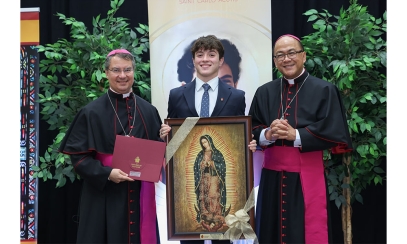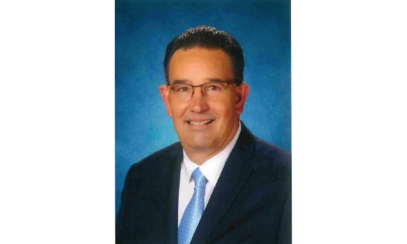
“We can serve our weakness, or we can serve our purpose.”
Movie Review: Cabrini
Movie Review: Cabrini
Angel Studio's new movie “Cabrini” powerfully presents the strength and power of Francesca Cabrini, a frail, young, consecrated woman with an empowering vision of creating a support network to help people experiencing poverty, especially children and orphans. Francesca, who would later become the first American citizen to be canonized by the Church, is shown overcoming many obstacles to achieve her dream of caring for society’s most vulnerable groups, especially children and, in America at that time, Italian immigrants.
Angel Studio's new movie “Cabrini” powerfully presents the strength and power of Francesca Cabrini, a frail, young, consecrated woman with an empowering vision of creating a support network to help people experiencing poverty, especially children and orphans. Francesca, who would later become the first American citizen to be canonized by the Church, is shown overcoming many obstacles to achieve her dream of caring for society’s most vulnerable groups, especially children and, in America at that time, Italian immigrants.
The movie depicts the misery, extreme poverty, and rejection experienced by many Italian migrants during the late 19th-century European immigration waves to the United States. Set in 1889, it captures the prejudice and racist attitudes of society against immigrants as well as its explicit social bias against emboldened women. Italians were considered “a wave of brown filth” overrunning the country in the eastern seaboard of the country, and most women, consecrated or not, were unlikely to be taken seriously in that milieu.
The movie does an excellent job portraying Cabrini as overcoming a myriad of impossibly personal, racial, and logistical obstacles against a backdrop of being told repeatedly, “You do not belong here!” by her adversaries. She first experiences a sense of personal displacement with two near-death experiences as a child — premature birth and a drowning experience — and later, as a young adult, when five religious communities reject her application because of her chronic poor health. Even the Vatican would later criticize her for insisting upon serving in the United States, a foreign mission at that time. They also criticized her for being so outspoken that she spoke out of place. Once she finally arrives in New York, she faces being perceived by many yet another unwanted Italian immigrant and is again told to either “Stay where you belong!” or “Go back where you belong!”
Cabrini’s entrepreneurial spirit and strength, which enabled her to build what she calls “an empire of hope” through a network of orphanages and schools, also shines forth in the movie. She routinely confronted religious and secular authorities with a spirit of strength and determination. She also displayed obedience to what she believed was her God-given call, even after exhausting all possible earthly means at her disposal. Though it all, she is faithful to her mission, as she puts it, “We can serve our weakness, or we can serve our purpose.” This disposition eventually gained her support from the Pope and Bishop of New York.
Cabrini is not portrayed as pious, and the movie does not show her religious calling. She is depicted as frail yet smart, poor yet resourceful, bold yet obedient, and unstoppable who has been given a mission. There are very few moments, mostly abstract, that focus on her prayer life wherein she receives the strength to follow her mission. The movie emphasizes her drive and insistence on never giving up on what the Holy Spirit has called her to do. However, her relationship with God is only shown implicitly. She is portrayed as a woman empowered with a vision of a world where people experiencing poverty are cared for, and immigrants are given equal dignity and chances in society.
There are some resounding dialogues in the movie. Cabrini encourages her sisters, who are on that mission with her, to accept the circumstances and “to face their fears and to lead,” thus demonstrating that “they can do all things in the power of Christ.” At one point, Mother Cabrini spells out exactly how the sisters and volunteers teach the orphaned children, “They read in English so they can learn to be in and to love America, but they sing in Italian, so as not to forget the love for their original country.”
Throughout the movie, and to the viewer, the future saint, Mother Cabrini, emphasizes the dignity of all, including immigrants, and envisions a society where “Migrants (Italians) are not just needed to clean the toilets but part of the Senate” and other important sectors of society. These dialogues resonate strongly with today’s reality and the struggle of many immigrants and refugees, which adds a resonating sense of the film’s relevance to today's audience. “Cabrini” is a powerful movie showing how social justice is a driving force behind the Church and its institutions, how far we still need to come, and how the most unlikely figures of the past, such as an Italian nun who emigrated to the United States in the 1800s can change the lives of an entire population, country, and Church.
Sister Ellen Hess works as the episcopal delegate for men and women religious of the Diocese of San Jose. She Is a member of the Verbum Dei Community. She also loves to read, bicycle riding and cooking. You can also find her playing and walking Merlin, her religious community's mischievous beagle.




